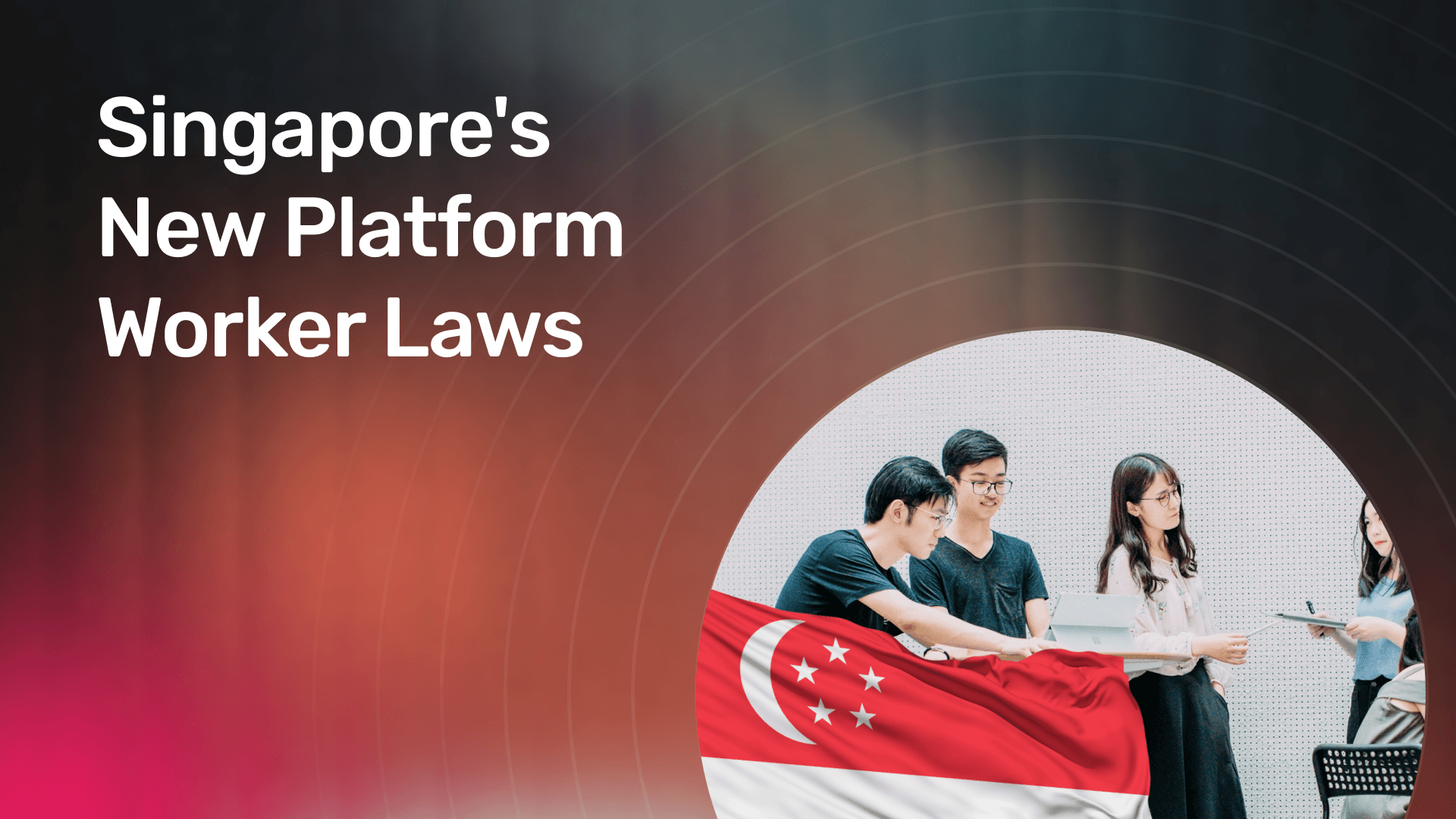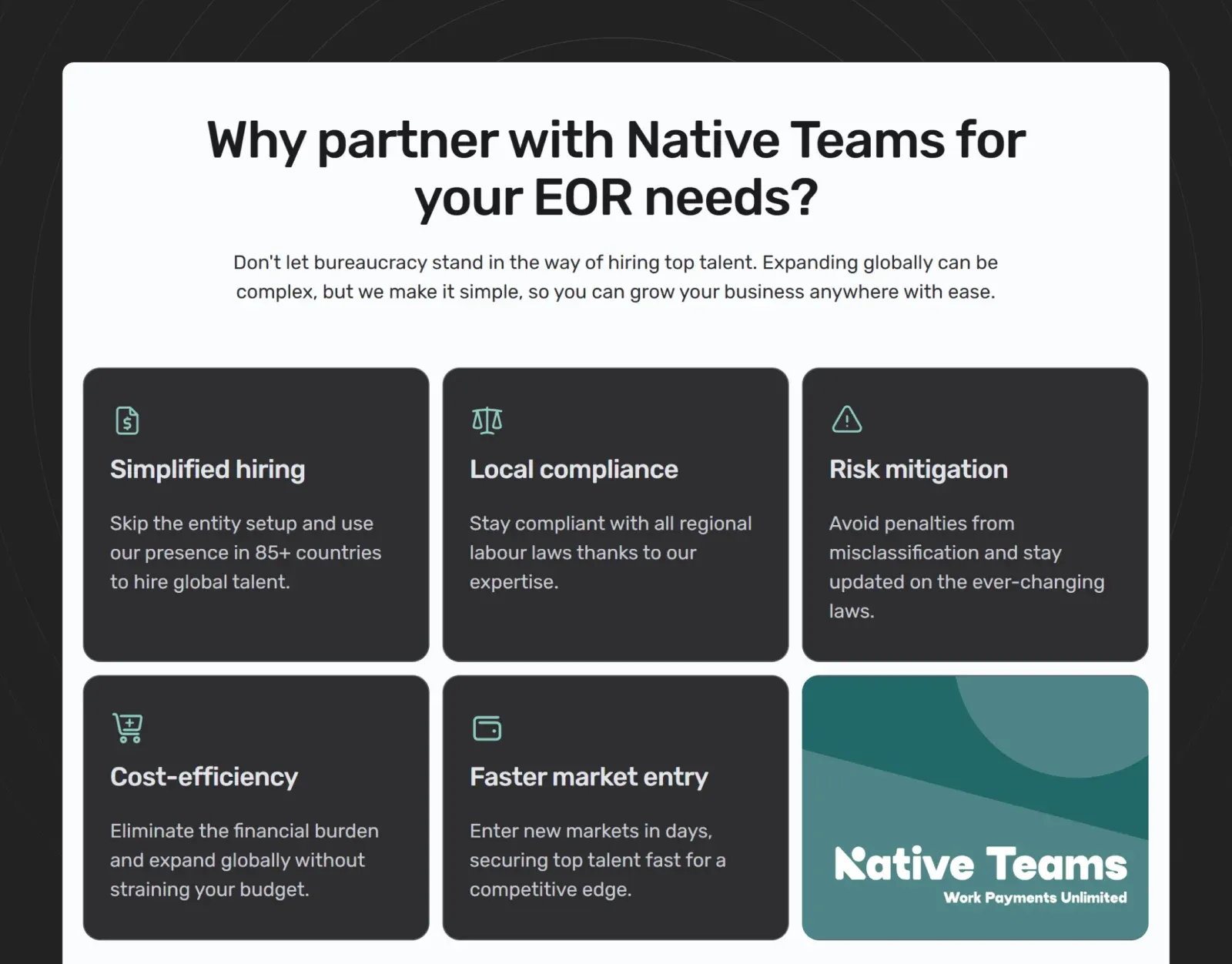Singapore Platform Workers Act: Guide for Indian Companies Hiring in Singapore
Singapore is one of India’s closest economic partners and a strategic gateway to the Southeast Asian market. As Indian startups and SMEs scale globally, many look to Singapore for its world-class digital infrastructure, English-speaking talent pool, and startup-friendly regulations. These factors have made Singapore a go-to destination for outsourced support, particularly in roles such as tech, customer success, design, and logistics.
But the freelance-first hiring model that once made Singapore attractive is now facing legal headwinds.
Singapore is rolling out the Platform Workers Act, a set of new laws being progressively implemented from late 2024 through 2025, which aim to strengthen protections for remote workers. These rules impact how freelancers, delivery workers, and remote contractors are classified and paid, and they carry serious penalties for companies that get it wrong.
For Indian companies working with Singapore-based remote workers, the risks of worker misclassification are now very real. What once looked like a simple remote contractor agreement could now be interpreted as an employment relationship, making the Indian business liable for social security (CPF) contributions, insurance, and compliance reporting under Singapore law.
In this blog, we will break down:
- What the Platform Workers Act changes
- Why it matters specifically to Indian businesses
- What misclassification looks like under Singapore law
- And how an Employer of Record (EOR) can help you stay compliant

Why Singapore matters for Indian companies
Beyond legal risk, it’s important to understand why Indian companies hire in Singapore in the first place - and why this trend is likely to continue.
- Economic partner: In 2024–25, Singapore accounted for 27.83% of India’s total trade with ASEAN, making it one of the country’s top trade and investment partners in the region.
- Tech ecosystem: Singapore is home to over 9,000 startups and ranks among the top 5 in global innovation indexes.
- Digital workforce: With one of Asia’s most digitally skilled and English-fluent populations, Singapore offers high-quality freelance talent in areas like app development, UI/UX design, digital marketing, logistics coordination, platform operations, etc.
The rise of digital platforms like Grab, Deliveroo, Foodpanda, and Lalamove further enabled Indian businesses to plug into Singapore’s workforce without setting up a local office. It’s common for Indian founders to hire platform workers in Singapore to support last-mile delivery, expansion pilots, or marketplace operations.
This low-barrier hiring model helped Indian SMEs scale faster, but it’s also what creates compliance risks under the new law. Many companies still assume that hiring “contractors” remotely means avoiding local obligations. Under the Platform Workers Act, that’s no longer a safe assumption.
If your contractor in Singapore performs work under your control, follows your schedule, and depends economically on your company, then Singapore may view them as an employee, and you could be held accountable.

What changed in 2025? Understanding the Platform Workers Act
Singapore officially began implementing the Platform Workers Act in late 2024, with major reforms taking full effect from 1 January 2025. The Act is the result of recommendations made by the Tripartite Workgroup on Platform Workers, a committee comprising the Ministry of Manpower (MOM), the National Trades Union Congress (NTUC), and major industry players.
This reform was designed to close the protection gap between traditional employees and gig workers, especially those in ride-hailing, delivery, and courier services, who previously had limited access to social security and employment benefits.
Why was the law needed?
Remote workers in Singapore were increasingly seen as the backbone of essential services, but lacked many basic protections, such as retirement savings, workplace injury insurance, and representation in disputes.
To address this, the Platform Workers Act introduces:
- Structured CPF contributions to support long-term financial security
- Mandatory insurance coverage to protect against work-related injuries
- Formal mechanisms for dispute resolution and representation
- Greater co-responsibility from platform operators — and in some cases, hiring companies
Timeline and rollout
- Late 2024: Gradual phase-in of CPF contributions begins
- 1 January 2025: CPF deductions become mandatory for platform operators
- 2025–2028: Transition support provided to mitigate income impact
- By 2030: CPF contribution rates for platform workers fully align with employee standards
This law doesn’t just affect platform companies - businesses that contract platform workers and exercise control over them may also fall under regulatory scrutiny.

Platform Workers Act highlights: What it covers
The Platform Workers Act clearly defines who qualifies as a platform worker and outlines the responsibilities of platform operators - and, where applicable, hiring companies.
It applies to self-employed individuals who provide services via digital platforms, including ride-hailing, food delivery, and courier services such as Grab, Foodpanda, and Lalamove. These workers are not full-time employees, but under the new rules, they are entitled to certain statutory protections. Here are some of the key highlights under the new law:
CPF contributions
Beginning 1 January 2025, platform operators must deduct and contribute to CPF accounts monthly, based on worker eligibility.
For workers born on or after 1 January 1995:
- CPF contributions are mandatory.
- Deductions go toward Ordinary, Special, and MediSave Accounts.
- Rates will gradually increase to match those of full-time employees by 2030.
- Employers match the worker’s CPF share, increasing overall benefits.
For workers born before 1 January 1995 (they can choose to opt in):
- If they do opt in:
- CPF contributions (from both the worker and the platform) apply across all 3 CPF accounts.
- They become eligible for transition support schemes and related benefits.
- If they do not opt in:
- Only MediSave contributions apply.
- No employer-matched CPF contributions will be made.
Insurance coverage
The Act mandates that platform operators provide work injury compensation insurance for eligible gig workers, bringing their protections in line with those of traditional employees under the Work Injury Compensation Act (WICA). This covers:
- Work-related injuries: Compensation for accidents and injuries sustained while performing tasks.
- Medical expenses: Reimbursement for healthcare costs resulting from these work-related incidents.
This is a significant change, as previously, these workers were considered self-employed and had no such safety net.
Dispute resolution & representation
The Act established a formal framework for industrial relations, a first for Singapore's economy. It allows platform workers to:
- Be represented by associations: Workers can be members of Platform Work Associations, such as those affiliated with the National Trades Union Congress (NTUC).
- Formal dispute resolution: These associations have the legal standing to negotiate with platform operators and represent workers in disputes, with a structured process that can involve the Ministry of Manpower (MOM) for conciliation and the Industrial Arbitration Court (IAC) for arbitration.
Legal classification criteria
Worker classification now goes beyond what’s written in a contract. Legal status is based on:
- Who controls how and when the work is done
- Whether the worker uses the company’s tools or systems
- If the worker is economically dependent on one platform
- Whether they can take jobs from other clients freely

The cost of misclassification in Singapore
In Singapore, misclassifying workers, intentionally or otherwise, can have serious legal and financial consequences for businesses. The government closely monitors how companies engage talent, especially in cases involving freelancers, contractors, and platform workers.
If a business misclassifies an individual as self-employed or a contractor when they should legally be treated as an employee, it may result in failing to meet mandatory obligations such as tax filings or CPF (Central Provident Fund) contributions.
Penalties for misclassification may include:
- Fines of up to SGD 5,000 for failing to meet tax filing or clearance requirements due to misclassification.
- In cases involving tax evasion or fraudulent reporting, penalties can include:
- Up to 400% of the underpaid tax
- Fines of up to SGD 50,000
- Imprisonment of up to five years
- If the case involves tax avoidance rather than evasion, a 50% surcharge on the tax adjustment is typically applied. This can be partially or fully waived if the employer demonstrates valid reasons for the error.
Failing to make CPF contributions in line with the CPF Act may also lead to:
- A fine of SGD 1,000 to SGD 5,000, imprisonment for up to six months, or both for first-time offences.
- Repeat offenders may face fines between SGD 2,000 and SGD 10,000, imprisonment for up to 12 months, or both.
Additional risks include:
- For repeated violations, the Ministry of Manpower (MOM) can suspend business operations or revoke the licences of Singapore-registered platforms.
- MOM actively conducts random compliance audits to identify misclassification and related breaches.
- Singapore has a pro-worker, transparent legal system. Businesses found non-compliant risk losing credibility, being blacklisted, or being excluded from future investment or partnership opportunities.
How can an Employer of Record (EOR) solution help?
Even if your business is based in India, hiring a Singapore-based freelancer or remote worker (especially one doing regular or scheduled tasks) could expose you to legal and financial risk.
If your team manages their hours, performance, or work tools, Singapore’s law may interpret that as an employer-employee relationship, not an independent contract, even if they work remotely. The safest way to stay compliant is to work with a local Employer of Record (EOR) like Native Teams.
What does an EOR do?
An EOR is a locally registered partner that employs your worker on your behalf. You still manage the work, while the EOR handles all local employment obligations and keeps your business compliant.
With Native Teams as your EOR in Singapore, here’s what you can expect:
- Accurate worker classification: We assess your working arrangement using MOM’s criteria and classify the worker correctly to avoid misclassification issues.
- Locally compliant contracts: We issue employment agreements that follow Singaporean labour laws and reflect best practices for businesses hiring internationally.
- Full statutory compliance: From CPF contributions and government-mandated insurance to leave entitlements and benefits, we take care of it all.
- Payslips, filings, and audit support: Native Teams provides local payslips, manages tax filings, and keeps your records audit-ready if MOM or IRAS conducts a check.
- No need for a Singapore entity: You get the ability to hire in Singapore, without opening a local office or navigating complex legal requirements on your own.
By partnering with Native Teams, Indian businesses can scale into Singapore quickly, legally, and confidently, while we take care of the local regulations behind the scenes.
Want to learn more about the hiring regulations and best practices in Singapore? Read our Singapore hiring guide for everything you need to know.

Final thoughts
The Platform Workers Act is a progressive but strict step toward protecting gig workers in Singapore, and it comes with serious responsibilities for employers.
For Indian startups and SMEs, this means it’s no longer enough to simply call someone a “freelancer” and hope for the best. Misclassification risks are real and costly.
An Employer of Record (EOR) can help you stay lean, compliant, and focused on growth, without worrying about CPF forms, insurance mandates, or worker disputes.
If you’re planning to work with Singapore-based talent, now is the time to act, before the law catches up.
